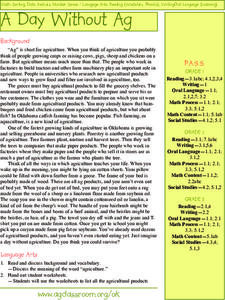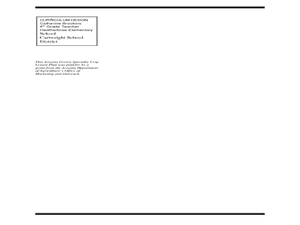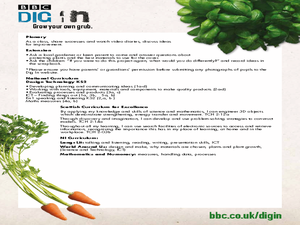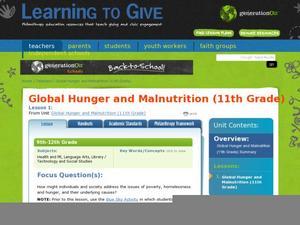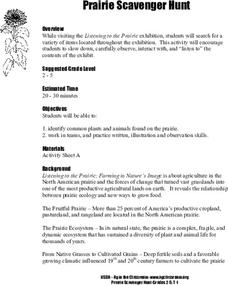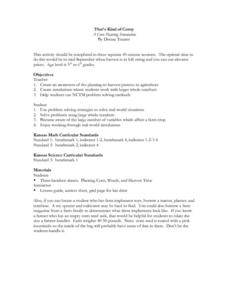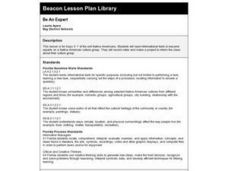Curated OER
Being the Boss: Entrepreneurship
Young scholars describe the meaning of entrepreneurship and list three characteristics of entrepreneurship. They discuss the disadvantages and advantages of being an entrepreneur. They identify potential entrepreneurship opportunities in...
Curated OER
A Day Without Ag
Learners investigate the concept of agriculture. They focus upon the presence of agriculture and the personal implications of it. Students generate lists related to the concept to encourage group discussions. The products of agriculture...
Curated OER
Food Safety Teamwork
Students examine the different members of food safety teams and their role in the food safety cycle. They study how these teams work together to keep our food safe.
Curated OER
A Day on a Farm
Students discuss their morning as they prepared to come to school. The teacher guides the discussion so students understand ways they relied on agriculture to accomplish tasks. Students view pictures of various farm machinery. As the...
Curated OER
Helpful Microorganisms
Students study how some microorganisms are helpful and practical in foods. They work with microorganism in a number of food, such as yeast in bread and yogurt.
Curated OER
Environment: Just Around the Bend
Young scholars decipher landforms on a map and corresponding satellite imagery. They consider the impact of pollution on agriculture and water. They draw diagrams demonstrating how pollution works its way into the food source.
Curated OER
Let's Make Stew!
Students investigate how to create a vegetable garden and complete related activities. In this vegetable garden lesson, students receive agriculture notebooks to complete vocabulary for the gardening lesson. Students read 'Still-Life...
Curated OER
Design Technology- Grow Your Own Grub
Students design a protective cover for outdoor plants. In this agricultural instructional activity, students use chicken wire, plastic sheeting, and empty bottles to construct a cover for lettuce leaves. Students take digital photos of...
Curated OER
We Garden: My Life as a Fruit or Vegetable
Students explore agriculture by participating in a role-play activity. For this farm to fork lesson, students ask and answer questions as though they were a specific plant about to be eaten. Students write responses to critical thinking...
Curated OER
From Seed to Apple
Students identify the stages of apple growth. In this agricultural lesson, students read the story I Am Apple and sing the song "Round the Apple Tree." Students place pictures of the stages of an apple into the correct order. Students...
Curated OER
What Parts Are There to a Plant?
Students explore botany by completing plant science worksheets. In this plant anatomy lesson, students examine real vegetables in class using magnifying glasses. Students identify the plants anatomy and complete worksheets discussing...
Curated OER
JUST A MATTER OF TIME
Students recognize the dynamic changes in themselves and in agriculture that have occurred through the years. They are shown pictures of a baby or students are asked to think of their little brothers or sisters or themselves in...
Curated OER
PEOPLE OF THE FERTILE CRESCENT
Learners evaluate how technology changed life in Mesopotamia. Students summarize the link between agriculture and religion in Sumer. Learners classify the Sumerians according to social classes. Students classify the causes and effects...
Curated OER
Biggest Trees in the United States
Students use the Internet (or printed sources) to locate information. They fill in missing information on a graphic organizer (chart) and use the data to answer questions. The research skills help students to develop higher order...
Curated OER
Comparing Countries
Students use a graphic organizer to research, compare and contrast two countries. They write a brief (or detailed - depending on age) report of their findings.
Curated OER
Global Hunger and Malnutrition
Is there a difference between hunger and malnutrtion? Is this a problem only in third world countries? How does hunger and malnutrition affect the community? Why do these problems exist when the world produces enough food to feed...
Rural Science Education Program
Bees and Flowers – Partners in Pollination
Why are bees so important? After several activities where kids investigate the form and function of flowers, they learn about the different types of bees and label them. They then examine pollen under a microscope and decide which bees...
Curated OER
Thanksgiving Feast (Read the Charts)
Learners practice reading charts about foods country of origin. They interpret information and answer questions related to charts. They discover how food production adds to the economy.
Curated OER
Prairie Scavenger Hunt
Here is a simple lesson for young learners on the plants, animals, and flowers found in the prairie environment. There are worksheets embedded in the plan that pupils use once a teacher-led discussion and demonstration has taken place....
Curated OER
Prairie Scavenger Hunt
Students search for a variety of items while visiting a Listening to the Prarie exhibition.
Curated OER
That's Kind of Corny!
Students apply math skills to determining how much corn seed to plant in 100 acres. They compute the amount of weed killer needed and after totaling how many bushels per acre they harvest, they calculate their profits.
Curated OER
Manufacture of Cheese
Students examine the steps and safety procedures in the cheese making process. They make and taste a variety of cheeses comparing their properties.
Curated OER
Be An Expert
Part of a series of lessons about bring Native American stories into the classroom, this plan suggests having kids research and take notes on one group of Native Americans and then complete a project that they present to the class. Pull...
Curated OER
From Foraging to Farming
Sixth graders understand the basic needs of humans. In this basic needs lesson, 6th graders participate in an activity to search for their basic needs. Students recognize the problems when their is scarcity of a necessity to their lives....

